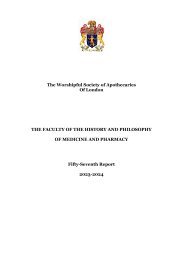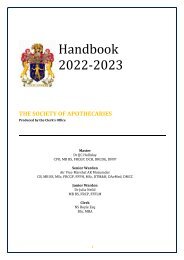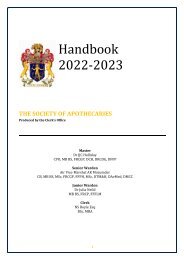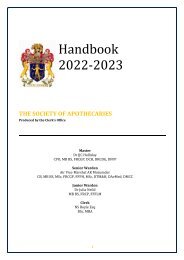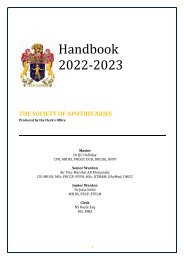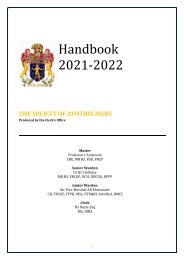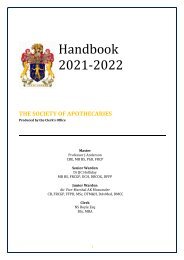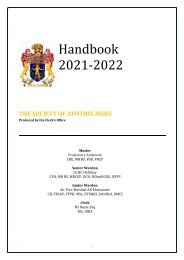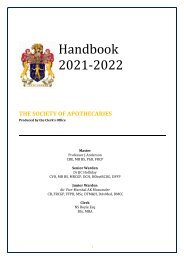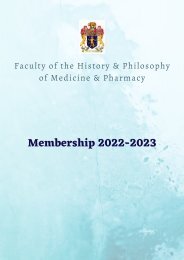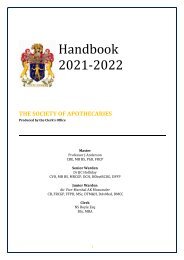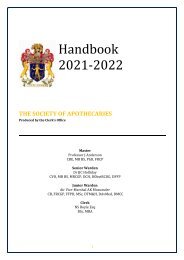Apothecary 2020
Journal of the Worshipful Society of Apothecaries for Master's Year 2019-20
Journal of the Worshipful Society of Apothecaries for Master's Year 2019-20
You also want an ePaper? Increase the reach of your titles
YUMPU automatically turns print PDFs into web optimized ePapers that Google loves.
Faculty of Conflict and Catastrophe<br />
Medicine Student Essay Prize <strong>2020</strong><br />
We are very pleased to announce a new Essay Prize<br />
which will be awarded to one of our current students of<br />
the Conflict and Catastrophe Medicine Course and will be<br />
published in the <strong>Apothecary</strong> Journal annually.<br />
This year we asked students to submit an essay which<br />
would demonstrate the impact of the Pandemic on<br />
healthcare workers. The <strong>Apothecary</strong> Editorial Committee<br />
were impressed with the essays submitted and there was<br />
a healthy discussion during the adjudication. The Essay<br />
Prize has been awarded to Safia Akhtar for her very<br />
heartfelt piece on her experiences during the pandemic.<br />
The reason that this Essay was chosen is that it documents<br />
some of the most striking aspects of the UK’s healthcare<br />
response to COVID19; it mentions how GP Practices were<br />
assessing patients in their car parks, Nightingale<br />
Hospitals as well as the realities faced by those that<br />
worked in hospitals such as the isolation faced by those<br />
dying without their relatives by their side, the physical<br />
consequences of proning patients and the various ways<br />
that the medical profession desperately try to maximise<br />
oxygenation when this new virus consumed the lungs of<br />
those afflicted. It also records the fact that so many<br />
seemed to be ethnic middle aged men who were some of<br />
the sickest in hospital which will, no doubt, be the subject<br />
of research in the future. It increases awareness on the<br />
moral injury faced by those making the difficult decisions<br />
when faced with a brand new virus and limited resource.<br />
On a happier, note it reveals how far we have come over<br />
the last nine months and we now have very real advances<br />
that have changed the management of these patients.<br />
We believe that future Apothecaries reading this piece<br />
will get a good flavour of the pandemic we faced in <strong>2020</strong><br />
in comparison to historical pandemics, we hope you agree.<br />
Dr Christina Dale MBBS FRCEM<br />
President, Faculty of Conflict & Catastrophe Medicine<br />
“I’LL TAKE SOME TIME”. An answer I found myself<br />
repeatedly giving to questions from patients, colleagues<br />
and friends. Rather a “longitudinal” response<br />
accounting for an extended period of time, as I had just<br />
completed a Masters in Tropical Medicine studying<br />
epidemiology. Months earlier whilst completing field<br />
research, I had been offered roadside pangolins and<br />
bushmeat on my daily commute in central Cameroon,<br />
and here we had a novel zoonotic disease on my<br />
doorstep. I felt obliged to participate in the pandemic<br />
response.<br />
There was shrill excitement amongst peers in the<br />
global community. We had studied for such an event,<br />
that would require core public health principles to be<br />
applied on an international level. The amount of<br />
unrefined information being shared was remarkable.<br />
Opinions shouted over each other in a quest for<br />
attention, paralleled by the media’s attempt to sustain<br />
noise. Enough to give one a headache, which it did, so I<br />
muted most sources.<br />
In contrast, my patients in primary care were<br />
desperate for information. The hinderance in giving it<br />
38



